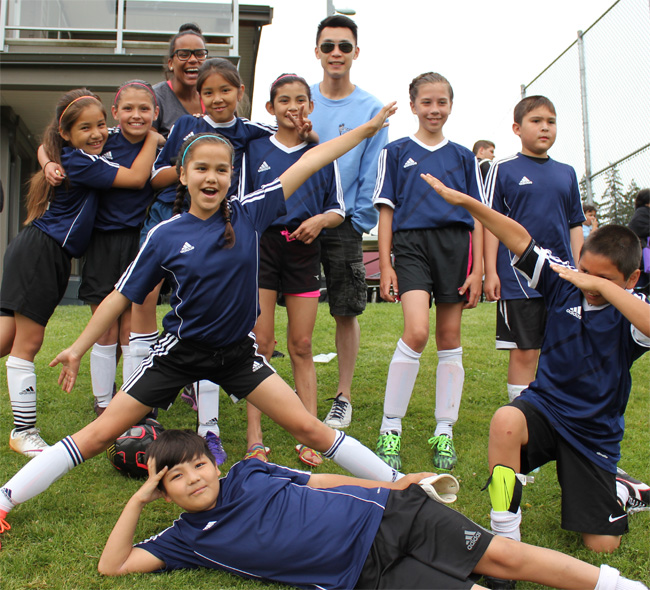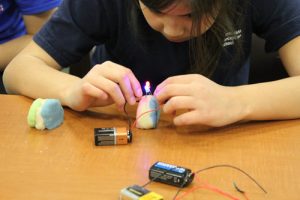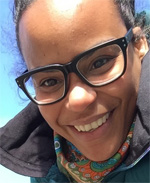
Every May long weekend, the Musqueam-UBC Youth Soccer Tournament hosts Indigenous youth soccer clubs from around the coastal region. Here, a Musqueam youth team show its pride.
July 12, 2017 – The following Q & A was conducted with the First Nations House of Learning’s Ryanne James, coordinator of the Bridge Through Sport program, a Musqueam-UBC initiative that combines recreational sports and educational activities for the benefit of Musqueam youth.
Please share something about yourself in relation to your work with Bridge Through Sport.
First of all, I’m a community builder and public engagement specialist. I have a background in social justice, mental and physical health, and Aboriginal youth empowerment. I’m also very interested in the design of our cities, and how art and culture play a critical role in creating the fabric and feeling for good, great and excellent physical and social spaces.
I am extraordinary grateful to have the opportunity to work with an exceptional team at Musqueam, outstanding student volunteers from UBC Rec, supportive UBC staff and faculty, and an incredible Work Learn student team to develop and deliver sport, recreation, health and educational programing for Musqueam youth through the Bridge Through Sport program. We are all fortunate to work with an amazing group of youth at Musqueam who are always engaged and contribute generously, and who work with all staff to ensure a program that reflects their interests.
What is Bridge Through Sport?
Bridge Through Sport is a partnership between the Musqueam Indian Band and the University of British Columbia, specifically UBC Recreation and the First Nations House of Learning, which administers the program. It provides programming for Musqueam youth with an emphasis on creating healthy, nurturing learning spaces where youth can develop self-confidence by working on their physical and mental health.
My team and I, which is comprised of UBC student staff and volunteers, work with the community to design and deliver activities that see youth exploring science, technology, engineering and math, as well as literacy and sports.
In 2003, the first Musqueam and UBC youth soccer tournament was held. Since then, the program has grown to include a reading, math, science and homework club, plus the Urban Native Youth Association Homework Club, the Musqueam Youth Program, and the Musqueam Youth Community Garden.
Through a recent partnership with the Musqueam Language Department, the program has begun to incorporate hən̓q̓əmin̓əm̓ language into its programing.
What was the inspiration behind the program?
Many Musqueam community leaders have a sports background, and many attribute their success to the values gained through playing sports. One of these leaders is Leona Sparrow, who worked with the UBC Department of Community Affairs to develop and support the program, which began in 2002.
How has the program been received in the community? What are some examples of its benefits?
The program has grown in popularity, evident by more youth participating every year.
One example of how youth have benefited is through the science activities the program has offered, which includes interesting experiments involving friction, circuits, dissection, and working with microscopes. Another example includes developing literacy by reading new and classic works by Indigenous and non-Indigenous authors.
But the most significant benefit, in my opinion, is the relationships that develop between the youth and UBC student mentors, who share their enthusiasm for their studies and interests, and who generally inspire the youth to think about their own educational paths in a positive way. In turn, the mentors speak to the joy, energy, and excitement they experience in the community, saying they really enjoy the weekly break from the stress of their studies.
How has the Musqueam-UBC relationship benefited as a result of the program?
The on-the-ground Musqueam-UBC relationship has, in my opinion, improved over the years as a direct result of the program. The youth and their parents, as well as other community members, have benefited from a positive program. Whereas, the University has been able to open doors in the community as it continues to work out its past of not altogether recognizing the Musqueam, in particular as it relates to the significant amount of land they lost as a result of the University’s creation. Plus, UBC is ideally situated to deliver on the promise of reconciliation between Musqueam and Canada, and the BTS program is one of many ways for that to happen.
I would also say that those youth who have participated in the program view the University in a positive light, and through the personal relationships that have developed over time, they have come to feel connected to UBC. Moreover, participating UBC students have gotten the opportunity to appreciate in ways that go beyond words alone what it means to study on the traditional, ancestral and unceded territory of the hən̓q̓əmin̓əm̓ speaking Musqueam people.
It should be noted that BTS is one of several established initiatives between UBC and Musqueam. For instance, the First Nations and Endangered Languages program, Musqueam 101 and MOA have had working relations with Musqueam for a while now. There’s also the UBC-Musqueam Memorandum of Affiliation signed in 2006. BTS, therefore, is but one part of a much fuller relationship.
What is your favourite BTS story?
 One story that stands out involves a youth who’s been participating in BTS for a number of years. This year, her school was having a science fair and she decided to recreate one of the physics activities we had done at BTS. Physics Outreach at UBC had hosted a Math & Science Club session, and one activity called Squishy Circuits involved combining circuitry and play-dough, which the youth loved. Anyway, the student contacted the BTS Math & Science Club coordinator, Henry Lai, who in turn contacted Physics Outreach who made the dough for the circuits. A UBC student took the dough, lights, motors, and batteries to Musqueam, and then the youth took the project to school. She was proud to share her knowledge gained at BTS with her class. Essentially, she was given an assignment at school, and said, ‘Sure, I will just get my friends in the UBC Department of Physics to get us sorted out for a class demo on circuitry.” Very cool.
One story that stands out involves a youth who’s been participating in BTS for a number of years. This year, her school was having a science fair and she decided to recreate one of the physics activities we had done at BTS. Physics Outreach at UBC had hosted a Math & Science Club session, and one activity called Squishy Circuits involved combining circuitry and play-dough, which the youth loved. Anyway, the student contacted the BTS Math & Science Club coordinator, Henry Lai, who in turn contacted Physics Outreach who made the dough for the circuits. A UBC student took the dough, lights, motors, and batteries to Musqueam, and then the youth took the project to school. She was proud to share her knowledge gained at BTS with her class. Essentially, she was given an assignment at school, and said, ‘Sure, I will just get my friends in the UBC Department of Physics to get us sorted out for a class demo on circuitry.” Very cool.
To me, this story shows just how strong her relationship with the University has become. But more so, it shows the strong relationship that has developed between people.
What comes to mind when you think about the program’s future?
Magic! The years ahead are full of possibility, including more fun, relationship building, learning, and excitement. That and it would be wonderful to see youth who have participated in the program enroll at UBC and then eventually be employed by BTS.
Plus, including hən̓q̓əmin̓əm̓ in the program will work to promote language acquisition and bring about a source of pride and community wellbeing for the youth.
Ideally, a commitment to promoting mental and physical health will lead to the youth becoming healthy, confident adults who will maintain a long and beneficial relationship with UBC.
Finally, what is the main highlight of the program?
The Musqueam-UBC Youth Soccer Tournament, held every May long weekend, is by far the highlight of the program. It takes place on the new fields at Musqueam and is an enormous source of pride, not only for the youth but also for the communities of Musqueam and UBC.
Around 450 youth participate in the tournament, with friends and family travelling from other First Nations communities in the Lower Mainland and beyond to support, connect, and share their enthusiasm for the sport of soccer.
The youth love the opportunity to show off their skills and show how they have progressed from year to year. This co-ed tournament gives youth an awesome opportunity to work together on the field, which helps to build camaraderie and respect between boys and girls, and with youth from other communities.
The Musqueam youth are tremendously proud of their skills, teamwork and the amazing facilities that they now have to share with other communities.
For more information on Bridge Through Sport, visit its website or contact Ryanne James.
Page Modified: July 24, 2017

Comments are closed, but trackbacks and pingbacks are open.